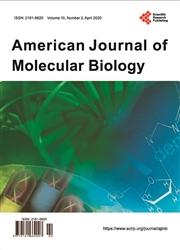pH-Dependence of Manganese (II) Oxidation Reaction by Novel Wild-Type and Mutants Recombinant Phlebia radiata Manganese Peroxidase 3 (rPr-MnP3) Enzymes
引用次数: 2
Abstract
The goal of this study was to determine whether mutation of the Mn-binding site of wild-type recombinant Phlebia radiata manganese peroxidase 3 affected the pH-dependence kinetic parameters. pH range investigated was 2.5 – 12.0. The catalytic efficiency of the mutant enzymes at high and low pH in comparison to the wild-type was investigated using standard rPr-MnP3 protocol. Wild-type recombinant Phlebia radiata MnP3 enzyme showed optimal activity with Mn (II) as substrate at pH 5.0 and remained moderately active (approximately 40%) in the pH range of 6.0 - 9.0. The rPr-MnP3 mutants’ maximum activity ranged between 5.5 and 8.0. Wild-type and mutants rPr-MnP3 enzymes exhibited a similar pH profile with optimum pH of 3.0 for ABTS oxidation. Mutation has severely decreased the catalytic efficiency for Mn (II) oxidation at pH 5.0. The rPr-MnP3 enzymes showed enhanced affinity for Mn (II) at alkaline pH and a more alkaline range for catalysis than ever reported for any Manganese Peroxidase. This study reveals that at higher pH, rPr-MnP3 can function with alternative ligands in the Mn (II) site and does not have an absolutely obligate requirement for an all carboxylate ligand set. These results further strongly confirm that Mn 2+ binding site is the only productive catalytic site for Mn (II) oxidation.新型野生型和突变型重组放线菌锰过氧化物酶3 (pr - mnp3)氧化反应的ph依赖性
本研究的目的是确定野生型重组放线菌锰过氧化物酶3的mn结合位点突变是否影响ph依赖性动力学参数。pH值范围为2.5 - 12.0。采用标准的rPr-MnP3方案研究了突变型酶在高、低pH下与野生型酶的催化效率。野生型重组辐射静脉MnP3酶在pH为5.0时以Mn (II)为底物表现出最佳活性,在pH为6.0 ~ 9.0时保持中等活性(约40%)。rna - mnp3突变体的最大活性在5.5 ~ 8.0之间。野生型和突变型的rPr-MnP3酶表现出相似的pH谱,ABTS氧化的最适pH为3.0。突变严重降低了pH 5.0下Mn (II)氧化的催化效率。在碱性条件下,rPr-MnP3酶对Mn (II)的亲和力增强,催化碱性范围比以往报道的任何锰过氧化物酶都要大。本研究表明,在较高的pH下,rna - mnp3可以与Mn (II)位点的替代配体一起发挥作用,并且不需要完全羧酸配体。这些结果进一步有力地证实了Mn 2+结合位点是Mn (II)氧化的唯一生产催化位点。
本文章由计算机程序翻译,如有差异,请以英文原文为准。
求助全文
约1分钟内获得全文
求助全文

 求助内容:
求助内容: 应助结果提醒方式:
应助结果提醒方式:


